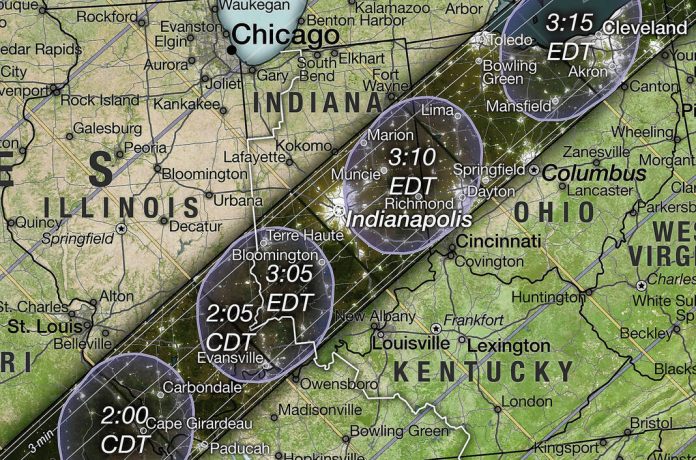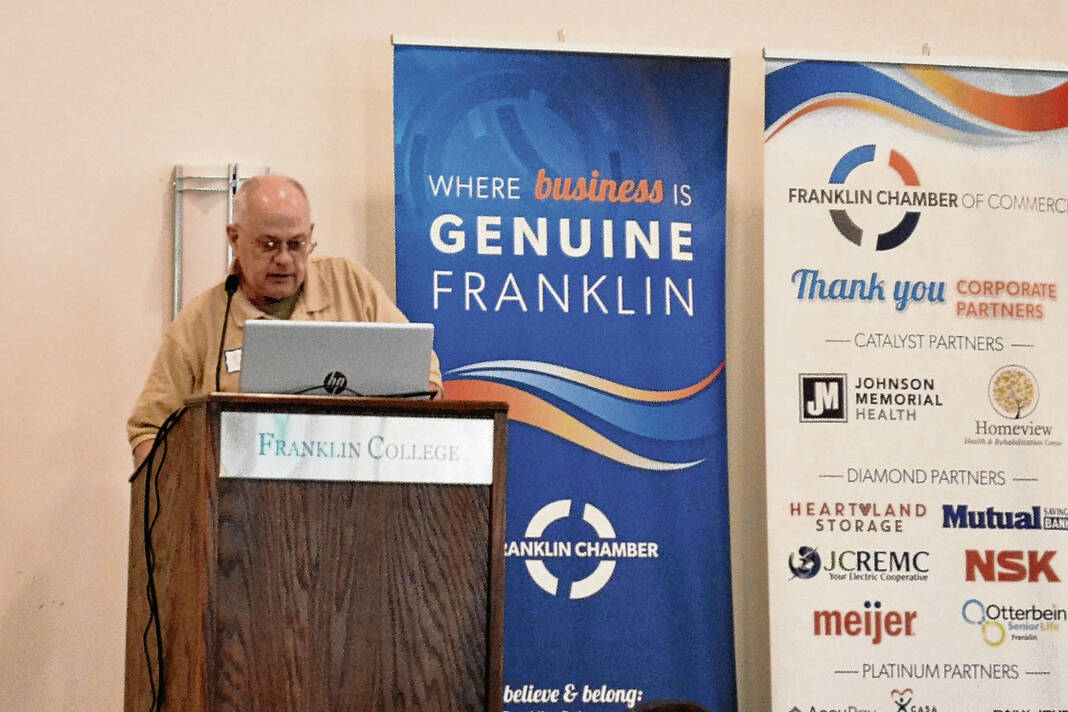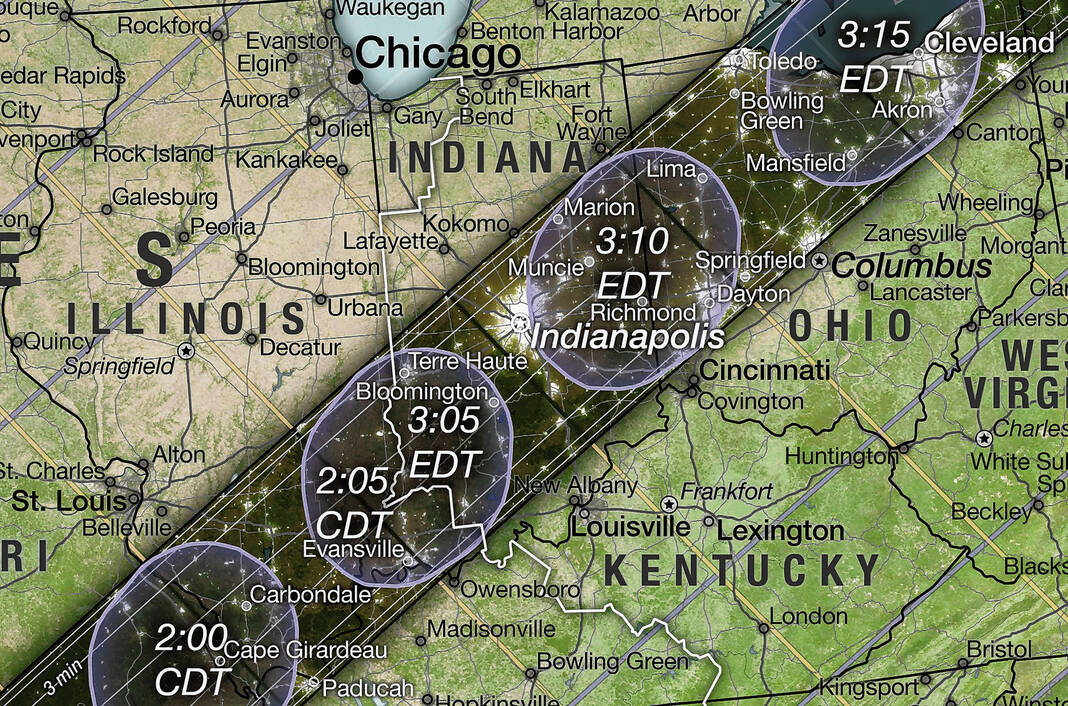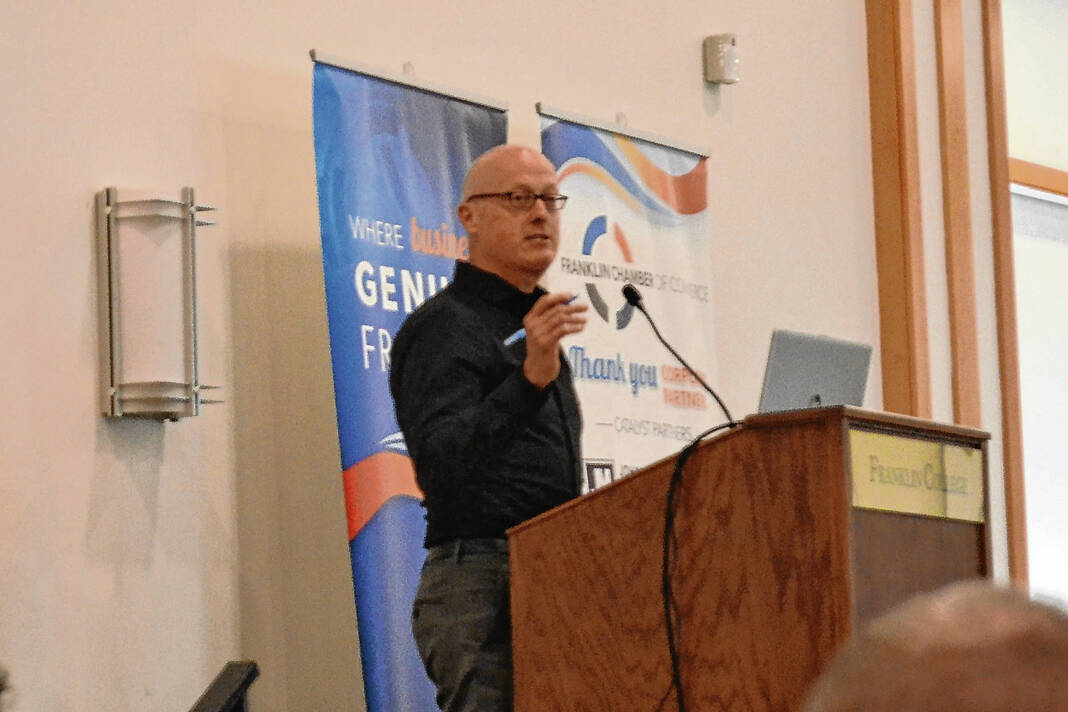Eclipse expert Dan McGlaun has traversed the globe to witness 15 total solar eclipses during his lifetime.
With a total solar eclipse on the horizon for Johnson County, McGlaun offered some key insights on the upcoming phenomenon at Franklin Chamber of Commerce’s luncheon on Thursday.
The eclipse will occur on April 8 shortly after 3 p.m. With Franklin lying in the centerline of the eclipse’s path, locals will experience one of the longest durations of totality in the country at just over four minutes of darkness.
The moon’s first contact will happen to the bottom right of the sun roughly an hour before totality.
“This is a very, very respectable eclipse,” McGlaun said. “I went to India for just a 47-second eclipse and I went to Kenya for an 11-second eclipse. There is an amazing amount of excitement that happens. Even outside of the path, people absolutely go nuts.”
McGlaun has heard predictions that between 50,000 and 200,000 people will travel to Franklin for the event, but he expressed confidence that Johnson County is more prepared than some other surrounding counties.
The city’s last total solar eclipse was in 1869 and the next one will occur in 2153. The Earth’s next total eclipse will be on Aug. 12, 2026 and can be best viewed in Iceland or Spain.
The most common question McGlaun is asked is what the weather will be during the solar eclipse. He said he has studied the weather conditions for every April 8 in Indiana over the past 20 years and that even though last year’s April 8 weather was “glorious,” poor weather conditions can still play a factor in this year’s eclipse experience.
McGlaun is familiar with poor weather during a total eclipse. He cited a particular incident during a trip to China in 2009.
“We were not just rained out, we were monsoon-ed out,” McGlaun said. “Eclipse chasers will keep airplanes on standby waiting to take us other places at the last minute or getting up above the clouds to see the eclipse. We couldn’t do that because there were thunderstorms. The day is going to be what the day is going to be. Even though it wasn’t the experience wanted, it was still an amazing experience. It got dark and it got black. The eclipse happened and you couldn’t see. Your eclipse day is going to be what it is.
“If you are around people who are special to you in a place that is special to you, that is your story. That is what eclipses do. They bring us together.”
McGlaun offered a few pieces of advice for those journeying to Johnson County for the celestial event.
Traffic jams are highly likely on April 8, especially during totality. McGlaun brought a map of the 2017 eclipse’s direct path and demonstrated how it correlated directly with traffic jams at the time.
He also strongly advised that viewers use proper eclipse eyewear while looking at the eclipse.
“Eye safety is really important. Use approved filters on your eclipse glasses,” McGlaun said. “The American Astronomical Society has a list of approved vendors and manufacturers. If you are given eclipse glasses that don’t say who made them, they could be knock-offs. Make sure you use them from a reputable source.”
Festival Country Indiana has eclipse glasses that are free for the public. The glasses are safe to use for viewing the eclipse, said Ken Kosky, executive director.
“If you are having an event, be sure to stop by Festival Country in Franklin, and we will give you as many free eclipse glasses as guests you are planning on having,” Kosky said.
McGlaun also dispelled some misconceptions regarding eclipse glasses. He advised to only wear them when looking at the eclipse and not walk around with them on.
However, once the moon has totally blocked out the sun and the eclipse enters totality, viewers can remove their glasses and observe the eclipse with their naked eye.
“These are partial eclipse glasses,” Glaun said. “They are designed to block the harmful rays from the sun’s disk. Even if a little sliver of the sun is showing, you need them. When the moon is totally covering the sun, you can look at it with your eyeballs. If you try to look at it with your glasses, you won’t see anything. That is a really important point. If you are outside the path of the eclipse, you always need the glasses. If you are inside the path, you always need them except during totality.”
Not wearing the glasses risks could result in loss of eyesight.
“They’re your eyes and you only have two of them,” Glaun said. “Your eyes will cook just like your skin will and you won’t feel it because there are no pain receptors in your retinas. You can be burning your retinas permanently and you will not know until the next day.”
McGlaun also advised against looking at the eclipse through binoculars, telescopes or camera lenses without an eclipse filter.
For more information, people can visit Eclipse2024.org. McGlaun’s website has a resources page that includes accurate eclipse animations and simulators, and features 146,000 communities in the database, including Franklin.








